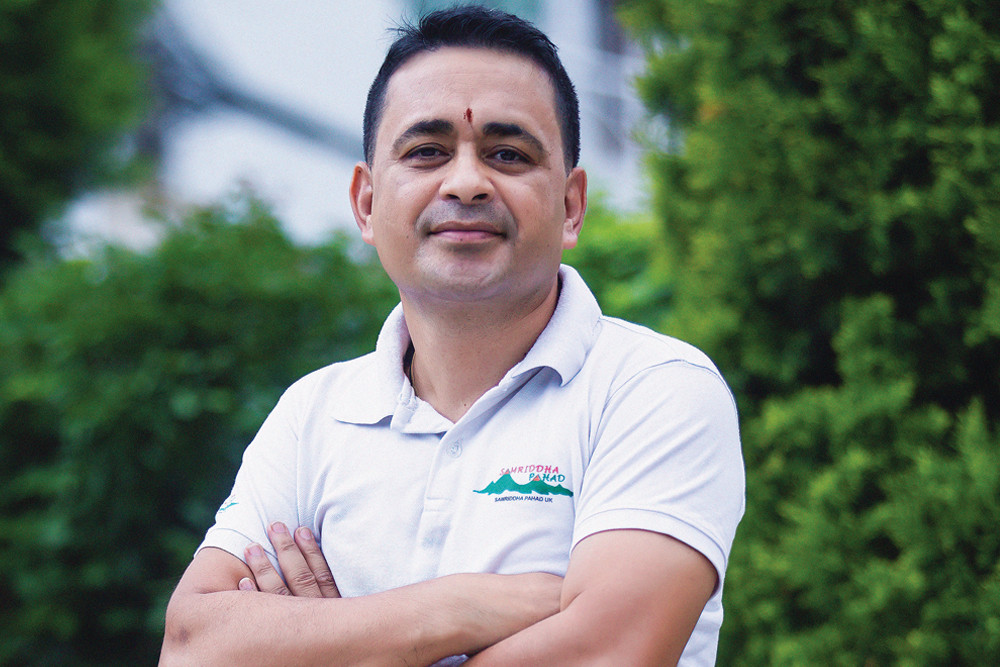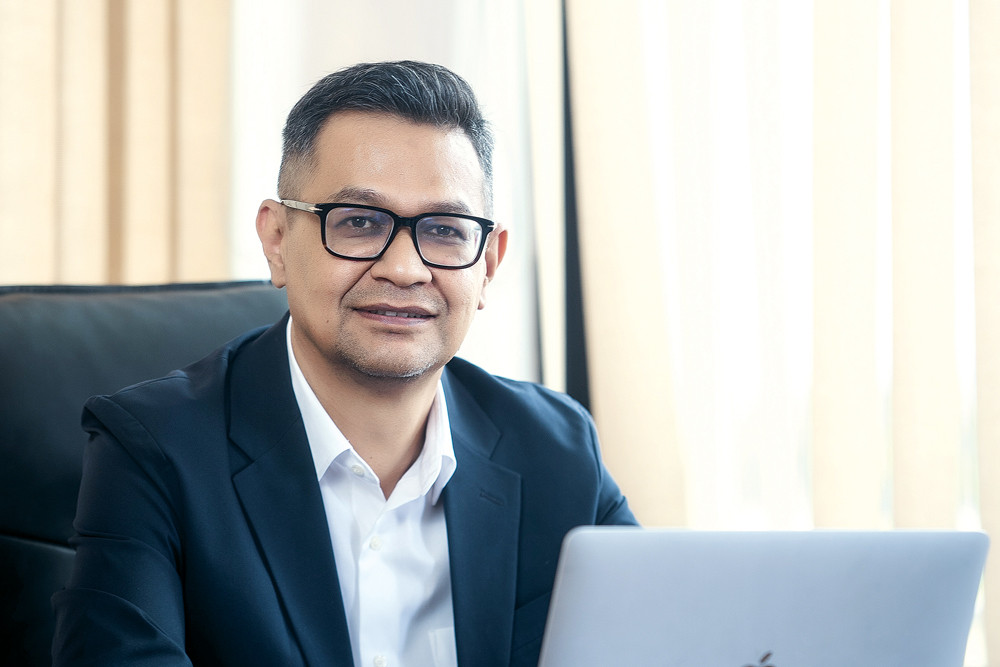.jpg)
Monika Bhattarai Adhikari
Vice-Chairperson, Social Welfare Council Nepal
‘Actions speak louder than words’ is the belief that has propelled the career of the Vice-Chairperson of Social Welfare Council Nepal, Monika Bhattarai Adhikari. Adhikari has always been passionate about the social sector and the opportunity to work on women empowerment with an organisation called Women Lead during her late teens solidified her interest. “I gained a lot of insight and being assigned to conducting several training programmes helped me hone my organisational skills,” she reflects. A student of Botany, she then went on to pursue a Masters Degree in Sociology.
Commitment is the key to success says this multifaceted individual who also runs a pharmacy. A little-known fact about Adhikari is that she is also a certified yoga teacher.
In this edition of Business 360, we spoke to her to learn her views on leadership and the role of Social Welfare Council Nepal (SWC). Excerpts:
What does leadership mean to you and what makes a successful leader?
Leadership is all about inspiring and moving along with the team to achieve a common goal. Individuals who believe in leaving no one behind and in inclusivity can and will go far in life, and definitely become good leaders. Further, a leader must also be able to take quick decisions because people do not really trust an indecisive person. I also believe that a leader should always be able to walk the talk. Lastly, they should be able to gauge any type of situation because there are times when one has to be tactful and times when one needs to be upfront.
Three things a leader should always be ready for
Leaders should always be ready to listen to others without any preconceived notion. They must be empathetic too. There are times when people commit mistakes unknowingly so a leader must sit down with the concerned person and try to resolve the issue. It always has to be a two-way dialogue. Like I mentioned earlier, they must also be quick decision-makers.
What strategies help you lead Social Welfare Council?
Previously, in our organisation it was rare to find leaders who would look into possibilities. What I would like to add here is that I may be the Vice-Chairperson overlooking the major decisions but every other employee in the institution should think of themselves as leaders in their own right. What I have seen in our country is that leaders tend to be more negative, no matter which field they are involved in. Innovative ideas are seen as risks rather than opportunities. Risk is associated with any new idea but if we give it a shot then who knows which idea could go on to become a great concept someday. We can always work on reducing the risk factor but the foremost thing is we should at least try. If you approach any task with negativity, then oftentimes the outcome too will be such. Instead of being appreciative leaders here are critical of new ideas. There is also a tendency of hastily visualising the future of any work, not keeping in mind the strengths, weaknesses, opportunities and threats that come along. We too were facing similar issues but that has now completely changed. The environment has changed and SWC has become a more optimistic, responsible and innovative institution.
Is an ideal leader a reality or a myth?
Honestly speaking, it is a myth. Nobody is perfect. There is always something to be learned. I believe ideal is a relative term. For instance, how you take charge of the family is different to what you do at the workplace. Leadership at the community level is different from that at the national level. Hence, leaders are obliged to perform differently in different situations. Some leaders might look perfect while working for the community but might not be properly performing their role at home. Therefore, nobody can be considered an ideal leader. However, I do believe people get inspired by somebody or the other in some way or the other. I, myself, am motivated and inspired by my mother-in-law. She is an example to all women of her age; her political ideologies have helped her shape both her personal and professional life. Having said that, she has her own weaknesses and flaws too.
What do you think inspires people to follow others as their leaders?
If a person has a good idea and their intentions are good, then others will follow that individual. Balen Shah, Mayor of Kathmandu, is a leading example of that. He never asked people to follow him. He had a vision which he was able to communicate to the masses and they elected him because they saw good in that vision. Another example is Harka Sampang, Mayor of Dharan. He identified that water scarcity was the biggest problem the city was facing and his resolution was to solve it, so people voted him in to office. However, the number of followers they have is ever-rising because they have actually worked on issues they pledged on.
Would you consider yourself a leader?
I think I will leave that to other people to judge. However, I am here in this position and have certain responsibilities. I will not say I am a leader because I have risen to this position but over the years I have learnt and tried to apply things that go into making a leader. What I can definitely say is that I am solution-oriented and fulfil my responsibilities to the best I can. While leading the team at SWC, I have always been empathetic with my colleagues.
Have you faced any situation whereby you had to change the way you lead your team?
I wouldn’t say a particular situation; it was like a process. Previously, I was an introvert and though I would put across my thoughts during any meeting or discussion, I would never interact. I, literally, would never listen to others. These days it is different; I speak less and listen more. Moreover, previously I used to react very quickly to a situation but now I have changed. I listen, think, visualise and then only respond. After realising these shortcomings, I have made conscious efforts to become a better leader.
What are the areas that the Social Welfare Council focuses on?
We are fundamentally a regulatory body. We are an autonomous wing of the government under the Ministry of Women, Children and Senior Citizens. The major role of SWC is to work for marginalised communities in areas where other relevant government bodies cannot reach. Further, SWC supports and coordinates projects being implemented by NGOs and INGOs which are sustainable, need-based and fall under the policy of the government.
The National Planning Commission publishes data of places where certain initiatives are necessary. After studying the data, we identify places with low Human Development Index and monitor concerned organisations working in these places. SWC also motivates and encourages NGOs and INGOs who are based in Kathmandu to work in such places. Therefore, our main work is to check whether a project aligns with the policy of the government, provide feedback, and work on necessary changes. We also are responsible for approving projects that fall under our purview and lastly, we monitor and evaluate those projects.
What are the most prominent issues prevalent in Nepal and what has been SWC’s role?
One of the burning issues in Nepal is the lack of funds due to which we have not been able to provide quality education, nutritious food, and proper health facilities to the needy. Projects of livelihood enhancement will help reduce such problems. When people are economically sound, every other need is fulfilled eventually.
The other issue I see is that we do not value and respect work. What I mean is if we think the work is big or involves prominent people then we value it or else we tend not to respect that work. Every type of work needs to be valued and when we start doing this then everybody will feel empowered. At the end of the day, development basically means when people do not have to depend on others for their bread.
Previously, the government used to allocate a budget for SWC annually, but since the last couple of years it has stopped doing so. As a result, we do not have sufficient funds to provide funds to others or initiate any project on our own. We encourage NGOs and INGOs to do the needful. We do not give priority to short-term programmes and projects such as food distribution or clothes distribution. We focus on sustainable projects as we are highly motivated by the thought - ‘Give people fish, you will feed them for a day but if you teach people to fish, you will teach them to feed themselves for a lifetime’.


.jpg)

